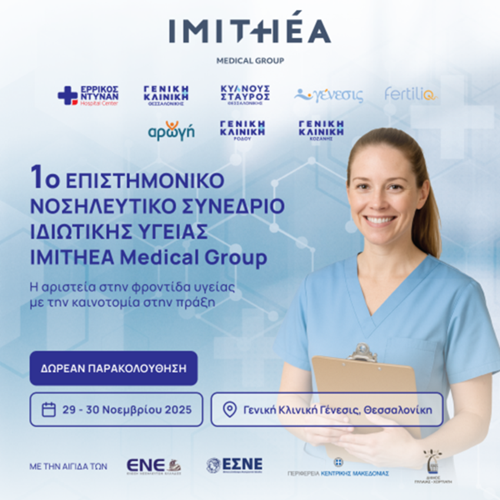New possibilities are opening up for a significant number of women—and for the field of gynecologic oncology—following the first officially documented pregnancy in Greece after successful treatment of endometrial cancer using a conservative hysteroscopic approach combined with in vitro fertilization (IVF).
This development confirms the high medical standards in Greece in the field of gynecologic oncology and assisted reproduction and, and sets a new precedent for women of reproductive age diagnosed with type I endometrioid carcinoma.
Thanks to an innovative approach and a multidisciplinary collaboration—led at every stage by Grigorios Grimpizis, Professor of Obstetrics and Gynecology at Aristotle University of Thessaloniki, President of the Scientific Council of Genesis Clinic and the Fertilia IVF Unit (both part of the IMITHEA Group, also owner of Henry Dunant Hospital)—a 34-year-old woman from Northern Greece, previously diagnosed with endometrial cancer, is now preparing to become a mother through IVF. Until recently, the treatment of endometrial and other gynecologic cancers was almost synonymous with permanent infertility for the patients, and adoption being their only option. However, the application of more conservative surgical procedures that resulted from advances in our knowledge of gynecological (endometrial) cancer treatment, and newer surgical techniques, such as hysteroscopy, laparoscopy, and robotic-assisted procedures, allowed for select patients with gynecologic cancers to achieve pregnancy naturally or through IVF.
The 34-year-old patient had originally undergone a diagnostic hysteroscopy for an endometrial polyp, performed by Professor Grimpizis, while already undergoing IVF treatment at Genesis Clinic. During the hysteroscopy, a focal endometrial carcinoma was identified. Following a thorough evaluation of the case by Professor Grimpizis and the oncology board—and in accordance with the latest European guidelines—it was decided that the cancer would be treated conservatively, through hysteroscopic removal of the lesion combined with pharmaceutical treatment, as an alternative to the standard approach of total hysterectomy with oophorectomy. This option allowed the patient to preserve her fertility and pursue motherhood later on through the transfer of existing fertilized eggs. With the hysteroscopic removal of the malignant tissue and appropriate pharmaceutical treatment, the lesion was successfully addressed. A follow-up hysteroscopy to check the endometrial cavity, conducted after completion of the therapy, confirmed that the cancer had completely regressed, and all tests came out normal.
Supported by her family, the patient then decided to take the next step—attempting pregnancy via embryo transfer using her previously fertilized, frozen eggs. The IVF procedure, carried out under the guidance of Professor Grimpizis and his team at the innovative Fertilia IVF Unit, was successful, and the pregnancy is now progressing normally.
“Her case marks the first documented successful pregnancy in Greece following conservative endoscopic treatment of endometrial cancer that preserved both the uterus and ovaries. This was a double gift of life for any woman who has faced such a diagnosis—and sets a promising course for the future”, emphasized Professor Grimpizis.





